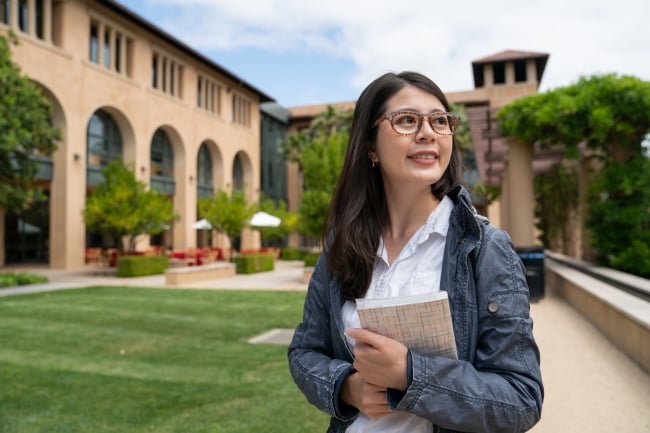You have /5 articles left.
Sign up for a free account or log in.

PRImageFactory/iStock/Getty Images Plus
“Three months.” The visa coordinator’s voice sliced through the quiet hum of laboratory equipment, each syllable laying another brick in the wall encircling my future. My familiar world of research and routine now felt claustrophobically narrow. A wave of fear and disbelief welled up inside me, hovering dangerously close to plunging into despair.
As I held the ultrasound photo in my pocket, it crinkled softly in my grasp, serving as a silent testament to the unexpected life flourishing amid the chaos of my professional turmoil. The imminent visa expiration, the pregnancy and my adviser’s sudden departure felt like fault lines snaking through the foundation of my postdoc journey, threatening to bring it all crashing down.
Amid this swirling chaos, a stark realization pierced the fog: I had dedicated eight years to experiments, analysis and deadlines, yet I had no blueprint for the road ahead. The absence of a clear forward-thinking strategy cast a profound shadow—a void more disconcerting than the immediate uncertainties before me. More than a professional dilemma, this moment represented a significant line dividing my past self from the future I was yet to shape.
Standing at the crossroads of change, I knew my journey as an international scholar demanded active self-advocacy, not just adaptation. Understanding and articulating our needs while making informed decisions becomes paramount when navigating the complex terrain of building a career in a new country. This isn’t a luxury; it serves as the guiding compass that keeps us oriented and propels us forward in these uncharted waters, far from the security of our familiar shores.
Craving a professional network, I dove into LinkedIn, meticulously crafting my online persona as a springboard for building meaningful connections and shaping my career path. This platform proved fertile ground for exploration, unveiling opportunities I never foresaw. As my profile evolved, it reflected my academic and personal growth—with each connection, endorsement and shared article contributing metaphorical bricks to my emerging professional identity.
However, that online achievement starkly contrasted with the intricate challenges that many international scholars face: the pervasive and profound impact of visa restrictions. These regulations are woven into every career aspiration, rendering the pursuit of stability a fragile and unpredictable journey.
To traverse this complex terrain, I actively pursued expert legal counsel to explore my options and remained receptive to unconventional career avenues that aligned with visa requirements. Yet I realized that authentic self-fulfillment extended beyond merely accommodating legal hurdles. It involved wholeheartedly embracing and cherishing the diverse cultural mosaic of my identity, which I had, perhaps inadvertently, downplayed.
During one of the early meetings that I attended as a Ph.D. student, I confidently introduced myself, each syllable of my name echoing my heritage. However, a seemingly innocuous question caught me off guard: “Do you have a simpler name to use?” This casual inquiry, while polite, subtly transformed my familiar name from something comfortable to out of place. It triggered a sense of not fully belonging in what should have been a welcoming environment. The perplexed expressions when I pronounced scientific terms with my accent and the gentle confusion over my cultural references amplified this feeling, leaving me questioning my true place within the academic community.
Then, within the warm embrace of international student groups, everything shifted. In those gatherings, my identity ceased to be a perceived barrier and became a source of communal strength and pride. This newfound sense of belonging wasn’t just liberating; it also illuminated the broader gaps in cultural understanding and underscored the pressing need for inclusivity within academic settings.
My personal narrative seamlessly became a chapter in a larger anthology of shared experiences, all resonating with a common yearning for recognition and a voice. To fully embrace my identity, I took concrete steps: I ceased making excuses for my accent and instead spoke with unapologetic clarity. I started incorporating cultural elements into my attire during interviews, blending the traditional with the professional. I redirected my focus toward producing top-notch content rather than fretting about whether I would be understood. My journey mirrored the courage and resilience that countless international scholars must summon, each forging their own distinct paths yet confronting similar trials of adaptation and acceptance.
This newfound clarity prompted profound contemplation, urging me to ponder the potential of individual advocacy in challenging the expectations of assimilation within higher education. It led me to question, is it the unwavering efforts of different individuals or the collective action of a harmonious community that truly brings about transformation within our institutions?
To my fellow international students, I say this: own your stories. Share them with confidence, not apology. In those narratives lies the power to break down walls, to build bridges of understanding, and to unlock the vast potential that lies within each of us.
At the same time, while individual stories undoubtedly hold significant sway, my journey in self-advocacy has brought forth a fundamental truth: success is intricately linked to collective progress rather than solitary endeavor. Flourishing as an international scholar and professional is profoundly entwined with the unity and cooperation within a supportive network. For instance, my lab adviser recognized my potential amid uncertainties; his unwavering belief played a pivotal role in my decision to pursue a Ph.D. Similarly, friends can act as beacons, sharing job leads with messages like “You’re the perfect fit for this role,” while mentors can skillfully guide you and instill confidence with their seasoned insights and encouragement. Moreover, proactive supervisors don’t just oversee you—they also acknowledge and reward your contributions, provide motivation and affirm your impact on your field.
Consider the immense potential if our classrooms evolved beyond conventional learning, becoming fertile grounds for ongoing, deep discussions about cultural identity. Such an environment wouldn’t just benefit the individual; it would enrich our research and communities. Diverse perspectives foster innovative thinking, leading to more comprehensive and creative research outcomes. When departments like International Services and Diversity join forces with student organizations, they create a robust network of support, encouraging a broader exchange of ideas and experiences. This collaborative approach not only enhances the quality of academic discourse but also strengthens the social fabric of our communities, cultivating a more empathetic, informed and inclusive society.
As I reflect on my journey, I see self-advocacy not merely as a skill but as an essential strategy, especially crucial for international scholars as we navigate our distinct paths through academe. A vital lesson has been the importance of prioritizing well-being. Asserting my needs and rights as an international professional is about balancing professional advancement with mental and emotional health. It’s about knowing when to adapt and when to assert, all while maintaining the self-care that is crucial for sustained success.
In high-stakes situations like job interviews and academic negotiations, where cultural nuances play a significant role, striking the right balance becomes imperative. This journey has taught me to blend analytical reasoning with cultural awareness, and to lean on a diverse network for guidance, enhancing my ability to respond to challenges with insight and adaptability.
For example, regarding the visa issue mentioned earlier, I sought advice from visa experts who provided a viable solution moving forward. That experience underscored a key lesson: knowledge is power. Staying informed about deadlines and understanding the intricate details of visa regulations early on is crucial. It taught me the importance of proactive planning and not leaving critical matters until the last minute. That proactive approach has become a guiding principle in both my professional and personal life.
As I conclude, I offer my fellow international scholars a piece of practical wisdom: cherish your unique experiences and let them guide you. Network not just for professional gain, but also to cultivate a supportive circle. Seek mentors who understand your path and can provide personalized advice. Gently remind yourself that while obstacles are part of the journey, embracing and expressing your distinct perspective is what truly enriches both that personal path and the wider academic community. Approach each day with kindness toward yourself and steadfast confidence in your voice.








